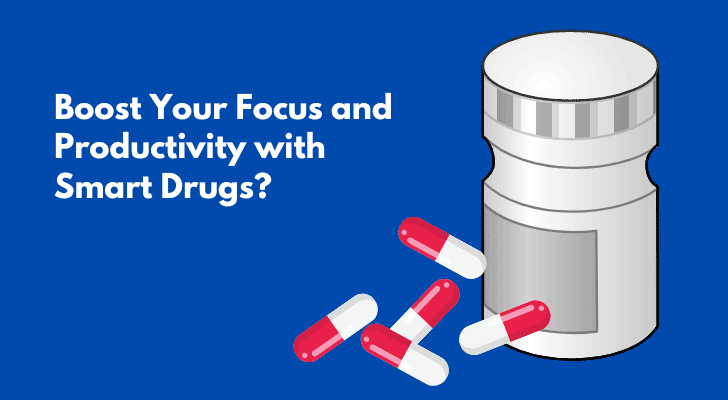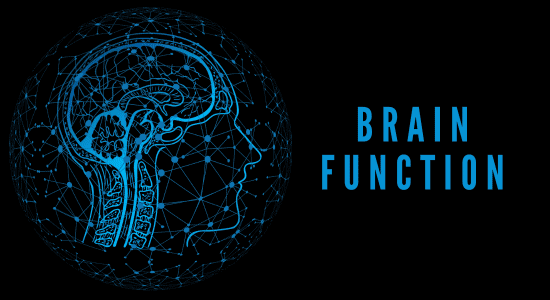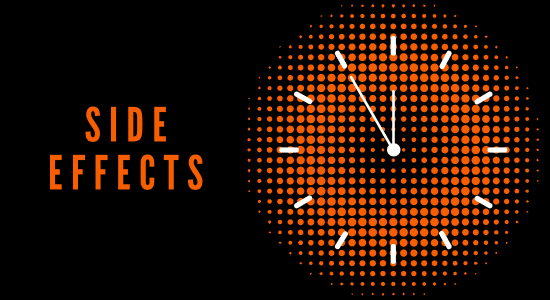We all talk about productivity and how we can stay focused on work. With the rise of home business opportunities and online learning, smart drugs can be the solution to help you stay on track and avoid distractions at home. A controversial yet increasingly popular way to focus. But what exactly are these drugs? How do they work? And most importantly, how safe are they? Are they useful for your work-from-home business?

What Are Smart Drugs?
Smart drugs, or study drugs, are supposed to be a class of prescription stimulants, commonly used to treat attention deficit hyperactivity disorder (ADHD) and narcolepsy. They work by increasing the levels of dopamine and norepinephrine in the brain, which help improve focus, alertness, and productivity.
But the drugs are often used by students to enhance their cognitive abilities and improve their academic performance. Also used by those who are seeking to boost focus, concentration, memory, and overall mental performance while studying or during exams.
Here are some common types of smart drugs:
- Prescription Stimulants: Medications like methylphenidate (Ritalin) and amphetamines (Adderall) are prescribed for conditions like ADHD but are sometimes misused as study aids due to their ability to increase focus and attention.
- Modafinil and Armodafinil: Prescription medications primarily used for treating sleep-related disorders, but they are also used off-label as cognitive enhancers due to their wakefulness-promoting effects and reported cognitive benefits.
- Racetam Nootropics: Substances such as piracetam, aniracetam, and oxiracetam, are believed to enhance memory, learning, and cognitive function. Their exact mechanisms of action are still under investigation.
- Herbal Supplements: Various herbal supplements are marketed as natural cognitive enhancers. Ginkgo biloba, Korean ginseng, Maca, Bacopa, etc. The effectiveness and safety of these supplements can vary, and research on their cognitive benefits is ongoing.
Misuse or abuse of these substances can lead to adverse effects, dependency, and legal consequences. Additionally, maintaining a balanced lifestyle, including proper sleep, nutrition, exercise, and effective study techniques, is essential for academic success.
Nootropics
Nootropics are perhaps the most popular "smart drugs" or "cognitive enhancers", particularly among students. They are claimed to improve cognitive function, including memory, focus, creativity, and motivation. While some people may find them helpful, the effects and safety of nootropics can vary, and not all of them have been extensively studied or approved by regulatory authorities.
Here are some of the popular nootropics:
- Piracetam: Piracetam is one of the oldest and most well-known nootropics. It is claimed to enhance memory and learning, but its mechanism of action is not fully understood. It is available in some countries as a prescription medication and in others as an over-the-counter dietary supplement.
- Aniracetam: Aniracetam is another member of the racetam family of nootropics. It is believed to improve focus, memory, and overall cognitive function. Like piracetam, it may be available as a prescription medication in some countries or as a supplement in others.
- Modafinil and Armodafinil: As mentioned earlier, modafinil and armodafinil are prescription medications primarily used to treat sleep-related disorders. They are also sometimes used off-label as nootropics due to their wakefulness-promoting effects and reported cognitive enhancement properties.
- Alpha-GPC: Alpha-GPC is a natural compound that is believed to increase levels of acetylcholine in the brain, which is important for memory and learning. It is sometimes used as a nootropic and is available as a dietary supplement.
- Bacopa monnieri: Bacopa is a herb commonly used in traditional Ayurvedic medicine. It is believed to have cognitive-enhancing effects, particularly in memory and learning. It is available as a dietary supplement.
How Do They Work?
Nootropics, modafinil, and armodafinil are believed to work through different mechanisms to enhance cognitive function. Here's a summary of their potential mechanisms of action:

Nootropics (such as racetams):
- Neurotransmitter modulation: Some nootropics, like piracetam, may influence neurotransmitter systems in the brain, including acetylcholine, glutamate, and GABA. This modulation is thought to enhance cognitive function and memory.
- Neuroprotection: Certain nootropics may have neuroprotective effects, helping to preserve brain health and function over time.
- Improved cerebral blood flow: Some nootropics, such as vinpocetine, are believed to enhance blood flow and oxygen delivery to the brain, potentially benefiting cognitive performance.
It's important to note that the exact mechanisms of action for different nootropics can vary, and research is ongoing to better understand their effects.
Modafinil and Armodafinil:
- Histamine stimulation: Modafinil and armodafinil increase histamine levels in the brain, promoting wakefulness and alertness.
- Dopamine regulation: These medications affect dopamine levels by inhibiting its reuptake, resulting in increased dopamine availability in certain brain regions associated with reward, motivation, and focus.
- Orexin activation: Modafinil and armodafinil stimulate the orexin/hypocretin system, which plays a role in regulating wakefulness, arousal, and appetite.
- Glutamate and GABA modulation: These medications may influence the balance of glutamate and GABA, two important neurotransmitters involved in cognition and wakefulness regulation.
These mechanisms collectively contribute to increased wakefulness, improved focus, enhanced cognitive function, and reduced fatigue.
The Risks
As you may already be aware, the use of smart drugs, including prescription medications and over-the-counter supplements, can come with certain risks and considerations.
Side Effects
Smart drugs can have various side effects depending on the specific substance and individual factors. Common side effects may include headaches, gastrointestinal issues, sleep disturbances, increased heart rate, elevated blood pressure, anxiety, irritability, and mood changes. The severity and frequency of side effects can vary among individuals.
Nootropics gave me headaches initially, but after a few times, I got used to it and experienced no more headaches. I had no other symptoms.
Dependency/Addiction
Some smart drugs, particularly those classified as stimulants, have the potential for dependency and addiction. Regular use or misuse of substances like prescription stimulants can lead to tolerance, meaning higher doses are required to achieve the same effects and dependence, resulting in withdrawal symptoms upon discontinuation.
This is the scary part; I make sure never to take it 2 days in a row so I won't get dependent.
Health Risks
Smart drugs can pose risks to individuals with pre-existing health conditions. It is crucial to consider the potential interactions between these substances and any other medications or health conditions you may have. For example, individuals with cardiovascular issues or psychiatric disorders may be at higher risk.
Lack of Regulation
Over-the-counter smart drugs and dietary supplements may not undergo the same rigorous testing and quality control as prescription medications. This lack of regulation can result in varying product quality, inconsistent dosages, and potential contamination.
Legal Consequences
The non-prescribed use of certain smart drugs, especially prescription medications, is illegal and can have legal consequences. Engaging in the unauthorized acquisition, possession, or distribution of these substances can lead to penalties and legal issues.
Ethical Considerations
Using smart drugs to gain an unfair advantage in academic or professional settings raises ethical concerns. It can create an uneven playing field and undermine the principles of fair competition and equal opportunity.

When To Take Smart Drugs
So when should you take them? You should consider peak cognitive demands of the day - determine the specific periods during your workday when you require enhanced cognitive function the most.
Plan ahead and think about (1) complex tasks, (2) Sustained attention, and (3) Peak mental performance of the day.
(1) Complex Tasks
Think about the tasks that require a high level of cognitive processing, critical thinking, and problem-solving. These tasks often involve analyzing information, making decisions, and finding creative solutions. Examples may include developing strategies, writing reports, conducting data analysis, or engaging in complex problem-solving activities.
(2) Sustained Attention
Consider the activities that demand prolonged focus and concentration. These tasks typically require you to stay engaged and attentive for an extended period without getting easily distracted. Examples may include reading and comprehending lengthy documents, studying intricate subjects, or participating in detailed research.
(3) Peak Mental Performance
Reflect on the times of the day when you naturally feel more alert, awake, and mentally sharp. For many individuals, cognitive abilities can fluctuate throughout the day, with certain periods being associated with enhanced mental performance. This can vary from person to person based on factors like chronotype (e.g., being a morning person or a night owl) and individual circadian rhythms.
So if you identify the specific periods of your workday when these factors align this way, you can also naturally plan the usage to coincide with those times.
This allows you to take advantage of the cognitive-enhancing effects of the smart drug when you truly need them the most. It can help optimize your performance during tasks that require heightened cognitive abilities and ensure that you are capitalizing on the benefits provided by the smart drug.
What Are The Good Effects?
People who use smart drugs regularly may have different experiences and opinions based on their individual circumstances and the specific smart drugs they use. Here are some common observations and reported experiences from individuals who use smart drugs:
- Enhanced focus and concentration: Many users report an improved ability to concentrate on tasks, maintain focus for extended periods, and minimize distractions.
- Increased productivity: Some individuals find that smart drugs help them accomplish tasks more efficiently and increase their overall productivity.
- Improved memory and learning: Smart drugs are often associated with enhanced memory retention, faster learning, and improved recall of information.
- Heightened mental clarity: Users may experience a clearer and more organized thought process, making it easier to make decisions and solve problems.
- Enhanced mood and motivation: Some individuals report an increased sense of motivation, improved mood, and a more positive outlook when using smart drugs.
- Reduced fatigue and increased wakefulness: Certain smart drugs, such as modafinil and armodafinil, are known for their wakefulness-promoting effects, helping users stay alert and combat fatigue.
Individual responses can vary, and not everyone may experience the same effects or benefits. For example, personally, I experience extreme fatigue when the effect wears out, so I tend to sleep longer that night.
And needless to say, smart drugs are not a substitute for healthy lifestyle habits, adequate sleep, balanced nutrition, and regular exercise, which also play a significant role in cognitive function.
Do Smart Drugs Make You Feel Optimistic?
They do make me feel optimistic, and slightly euphoric sometimes. But they are designed to make your brain work better and help you think more clearly. And when your mind is sharper and you're able to focus better, it can naturally lead to a more positive mindset.
Therefore, while they aren't specifically made to make you feel optimistic, some people might feel more positive and happy when using them. While some people may subjectively experience a sense of improved well-being or increased motivation when using smart drugs, it is not the same as experiencing euphoria.
Should You Really Take Smart Drugs?
If your work does not involve complex cognitive tasks or requires heightened mental performance, the need for smart drugs may be minimal. Smart drugs, such as certain nootropics and cognitive enhancers, are typically used by individuals who aim to optimize their cognitive abilities for tasks that require intense focus, memory retention, problem-solving, or creativity.
If your work primarily consists of simple or routine tasks that do not demand significant cognitive resources, you may not derive substantial benefits from smart drugs. It's important to assess your individual needs and consider whether the potential benefits of smart drugs align with the demands of your specific work.
However, it's worth noting that each person's situation is unique, and there may be instances where individuals choose to use smart drugs for other reasons, such as boosting general alertness or productivity. Ultimately, the decision to use smart drugs is a personal one, and it's important to weigh the potential benefits against any associated risks or considerations.
How I "Finally" Make Over $7,000 Monthly Income
"The most valuable thing I've ever done!"


Noopepect is dangerous, I took it daily and when I stopped it I started to have depression on a regular basis. It took me a few years to get myself clean completely. Never again.